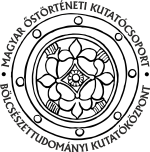Madjars in Anatolia: are they Hungarians, who migrated in the early modern age or are they Turkish nomads?
Sudár Balázs / Balázs Sudár
Hadak útján. A népvándorláskor kutatóinak XXIX. konferenciája. Budapest, 2019. november 15–16. / 29th Conference of scholars on the Migration Period. November 15–16, 2019, Budapest
MŐK Kiadványok 4.1 (2022) 505–522
DOI 10.55722/Arpad.Kiad.2021.4.1_29
Régóta ismert tény, hogy Anatóliában találunk madzsar („magyar”) elemet tartalmazó földrajzi neveket, Madzsar vagy Madzsaroglu nevű családokat és madzsar nevű nomád nemzetségeket. Származásukról két elképzelés fogalmazódott meg: az egyik szerint a közép vagy a kora újkorban Magyarországról származó kitelepülők, menekültek, esetleg felszabadított rabszolgáktól erednének, a másik szerint Magyarországhoz semmi közük, hanem a nomád törökség részét képeznék. A fellelhető adatok elemzése a következő eredményekre vezetett: Anatólia számos területén találunk madzsarokat, jóval több helyen annál, hogy kései magyarországi bevándorlóktól származtathatnánk őket. Kifejezetten gyakoriak a nomádokkal is kapcsolatba hozható adatok, és elég nehéz olyan történeti modellt felvázolni, amely alapján magyar menekültek török nomád nemzetségek névadójává válhatnának. Ráadásul már a 15. századból is vannak rájuk vonatkozó adataink: ők egészen biztosan nem Magyarországról származnak. A madzsarokra vonatkozó adatok jól megfeleltethetőek a többi anatóliai nomád törzs és nemzetség adatainak. Összességében tehát nem kételkedhetünk benne, hogy valamikor Anatóliába bevándorolt egy vagy több madzsar nevet viselő nomád nemzetség. Ugyanakkor ez a szó a török nyelvekben nem jelent semmit, e név a törzsinemzetségi névadásnak a régies rétegéhez tartozik. A nomád népek történetének ismeretében semmi akadálya nincs annak, hogy a hajdan szétszóródott korai magyarság kései leszármazottait lássuk bennük. Ennek egyébként történeti lehetősége is van: az Anatóliába költöző oguzok éppen onnan, az Urál vidékéről is sodortak magukkal néptöredékeket (például az alajontlugokat és a besenyőket), ahol a korai magyarok is élhettek. Így elképzelhető, hogy az anatóliai madzsaroknak mégis van közük a magyarokhoz, ám ez a kapcsolat jóval régebbi, mint ahogy sokáig gondolták.
Kulcsszavak: magyar, Macar, Macaroğlu, Anatólia, nomád, nemzetség
It is well known that geographical names are containing Madjar (Macar “Hungarian”) as an element in Anatolia, there are families called Macar or Macaroğlu, and nomadic clans called Madjar (Macar). There are two theories about their origin: the first one is that they are immigrants, refugees or liberated slaves originated from Hungary in the Middle or Early Modern Age, the second one is that they are a group of the Anatolian nomadic Turks, and they do not have any relationship with Hungary. There are the results of the analysis of the available sources: there are Madjars in many parts of Anatolia, in more places than it could be explained by late immigrants. The data refers to nomads, are very common, and it is hard to sketch a historical model, which justify the fact that Hungarian refugees became the denominator of Turkish nomadic clans. Moreover, according to the sources about these clans from the 15th century they could not originate from Hungary. The details about Madjars are similar to other nomadic clans in Anatolia. In conclusion it is certain that one or more nomadic clans moved into Anatolia, who called themselves Madjar. The word macar does not mean anything in the Turkish language, this name is a part of the archaic tribal-ethnic naming. It is evident to see them as a late scion of the early, scattered Hungarians, based on the knowledge about the history of the nomadic people. Otherwise, there is a historical possibility of this theory: the oguz people, which moved to Anatolia, took fragment people themselves (for example the Alayontlugs and Pechenegs) from the area of Ural Mountain, where the early Hungarians lived. So, it is possible that the Madjars in Anatolia have a relationship with Hungarians, but this relationship is much older than it has been thought for a long time.
Keywords: Hungarian, Macar, Macaroğlu, Anatolia, nomad, clan





